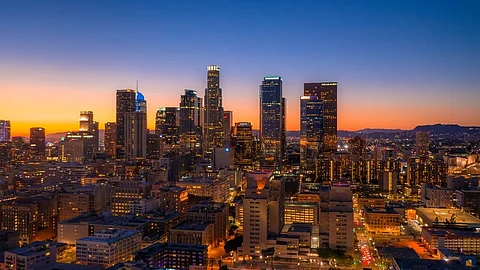

Nick Barragan is used to wearing a mask because his job in the Hollywood film industry has long required it. So he won't be fazed if the county that's home to Tinseltown soon becomes the first major population center this summer to reinstate rules requiring face coverings indoors because of another spike in coronavirus cases.
"I feel fine about it because I've worn one pretty much constantly for the last few years. It's become a habit," said Barragan, masked up while out running errands Wednesday.
Los Angeles is the most populous county, home to 10 million residents. It faces a return to a broad indoor mask mandate on July 29 if current trends in hospital admissions continue, county health Director Barbara Ferrer said this week.
Requiring masks again "helps us to reduce risk," Ferrer told Los Angeles County supervisors.
"I do recognize,” she added, “that when we return to universal indoor masking to reduce high spread, for many this will feel like a step backward."
Variants are tough to stop
Nationwide, the latest COVID-19 surge is driven by the highly transmissible BA.5 variant, which now accounts for 65% of cases, with its cousin BA.4 contributing another 16%. The variants have shown a remarkable ability to get around the protection offered by vaccination.
With the new omicron variants again pushing hospitalizations and deaths higher in recent weeks, states and cities are rethinking their responses and the White House is stepping up efforts to alert the public.
Some experts said the warnings are too little, too late.
"It's well past the time when the warning could have been put out there," said Dr. Eric Topol, head of the Scripps Research Translational Institute, who has called BA.5 "the worst variant yet."
Global trends for the two mutants have been apparent for weeks, experts said — they quickly outcompete older variants and push cases higher wherever they appear. Yet Americans have tossed off their masks and jumped back into travel and social gatherings.
And they have largely ignored booster shots, which protect against COVID-19's worst outcomes. Courts have blocked federal mask and vaccine mandates, tying the hands of U.S. officials.
For months, the White House has encouraged Americans to make use of free or cheap at-home rapid tests to detect the virus, as well as the free and effective antiviral treatment Paxlovid that protects against serious illness and death.
On Tuesday, the White House response team urgently called on all adults 50 and older to get boosters if they haven't yet this year and dissuaded people from waiting for the next generation of shots expected in the fall.
For most of the pandemic, Los Angeles County has required masks in some indoor spaces, including health care facilities, metro trains and buses, airports, jails and homeless shelters. The new mandate would expand the requirement to all indoor public spaces, including shared offices, manufacturing facilities, warehouses, retail stores, restaurants and bars, theaters and schools.
It's unclear what enforcement might look like. Under past mandates, officials favored educating people over issuing citations and fines.
Troubling trends
While hospitalizations and deaths have remained well below earlier spikes nationally, the current trends are troubling. Last month, daily deaths were falling, though they never matched last year's low, and deaths are now heading up again.
The seven-day average for daily deaths in the U.S. rose 26% over the past two weeks, to 489 on July 12. The coronavirus is not killing nearly as many as it was last fall and winter, and experts do not expect deaths to reach those levels again soon.
But hundreds of daily deaths for a summertime respiratory illness would normally be jaw-dropping, said Andrew Noymer, a public health professor at the University of California-Irvine. He noted that in Orange County, California, 46 people died of COVID-19 in June.
"That would be all hands on deck," Noymer said. "People would be like, 'There's this crazy new flu that's killing people in June.' "
Instead, simple, proven precautions are not being taken. Vaccinations, including booster shots for those eligible, lower the risk of hospitalization and death — even against the latest variants. But less than half of all eligible U.S. adults have gotten a single booster shot, and only about 1 in 4 Americans age 50 and older who are eligible for a second booster has received one.
"This has been a botched booster campaign," Topol said, noting that the Centers for Disease Control and Prevention still uses the term "fully vaccinated" for people with two shots of Moderna or Pfizer. "They haven't gotten across that two shots is totally inadequate," he said.
Noymer said if he were in charge of the nation's COVID response he would level with the American people in an effort to get their attention in this third year of the pandemic. He would tell Americans to take it seriously, mask indoors and "until we get better vaccines, there's going to be a new normal of a disease that kills more than 100,000 Americans a year and impacts life expectancy." (AP/VOA)
